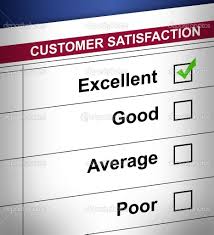 Have you ever filled out one of those ubiquitous satisfaction surveys? Of course you have. Everyone wants to know how satisfied you are. Whether it be your phone company or your local dry cleaner or your waiter, everyone is keen to quantify, record, and report your level of customer satisfaction.
Have you ever filled out one of those ubiquitous satisfaction surveys? Of course you have. Everyone wants to know how satisfied you are. Whether it be your phone company or your local dry cleaner or your waiter, everyone is keen to quantify, record, and report your level of customer satisfaction.
But despite the fact that satisfaction surveys are as annoyingly common as pennies, how truly useful are they? If you’re anything like me, you probably don’t provide exactly high quality response data to these surveys. If I cannot escape the survey without being rude, I just check “Excellent” for everything without even reading the questions. It’s the easiest thing to do. And what direct benefit is there in it for me to be thoughtful and honest? I’m much more likely to get better service next time if I indicate that my waitress is excellent in every possible way, especially if she was terrible!
And there are lots of reasons beyond immediate self-interest and laziness that most of us lie like Persian rugs on these surveys:
- People forget the bad stuff. We have selective memories, and the longer it is after our terrible customer experience, the more likely we are to remember it positively.
- People never want to seem like complainers. Even if we had gripes, we are programmed that complaining only reflects badly on us.
- People are nice. We don’t want to hurt anyone’s feelings unnecessarily – even if we are anonymous.
- People are habituated to say “I’m fine.” Even if we’re in the middle of vomiting up our lunch after being told that our beloved kitty just got electrocuted attacking an electrical outlet, we automatically say we’re fine.
- We assume no one <really> wants to know. We figure that this is pointless paperwork that no one will ever actually read let alone act on it.
- Saying everything was wonderful is the easiest way to dispense with this annoying and meaningless survey and get home in time for The Walking Dead.
Here’s an even bigger problem worth discussing in depth. We don’t know what we don’t know and have poor imaginations to envision what we could have. Satisfied compared to what? How do you rate your Toyota? Excellent. Oh wait, I didn’t realize I could have had a Porsche instead… Can I change that answer to Poor?
How do you rate your healthcare? Excellent? Great! But did you know that Norway has a healthcare system that costs ½ the price and ranks 11th to your 37th? Would you like to change your survey answer?
Since we don’t know what we don’t know let alone what we cannot even imagine, Poor to Excellent is not an absolute scale. It only encompasses what we know. If we’re given a dozen similarly bad options, we’re likely to rate the least worst of them Excellent. By the way, this is one of the reasons that “happiness scientists” tell us that more choices make us less happy. We become less satisfied with what we can get if we are made aware of all the better options that we cannot hope to get our hands on.
I have a more nefarious theory about these surveys. I think that smart customer service providers offer these surveys knowing all of this, but they figure that when you indicate that their service was great you’ll actually remember it as being great. Probably sound psychology!
But here’s the biggest problem with these victim-less white lies called satisfaction surveys. We sometimes really, really do need an accurate answer to assess satisfaction. We have lots of important social science studies that have little choice but to measure satisfaction through this sort of survey. Unfortunately, for all the reasons given, this data is usually just so much garbage in.
We need smarter measures of satisfaction.
One solution is to de-emphasize or even abandon the self-reporting of satisfaction measures. Instead, smart companies or researchers measure indirect indicators of satisfaction. Rather than ask for a self-reported satisfaction, they look at objective behaviors that correlate with satisfaction.
For example, given a subsequent choice of options, what option does the person actually choose? Do they recommend the option to others? Instead of asking whether they like the coffee or the ambiance of the restaurant, measure how many refills they ask for and how long they remain to digest and converse over their coffee.
Satisfaction surveys are just a microcosm within a wide range of human behaviors. In almost every situation dealing with people, looking at actual behaviors can tell us far, far more than relying upon anything they tell us about their motivations or their opinions.
I agree, it is hard to rate something without having something else to compare it to.
LikeLike
I only fill them in when I want a particular person to get praised/rewarded
LikeLike